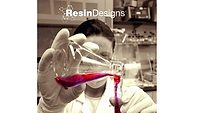Cal Poly Chemistry Team Designs Ecofriendly Glue

Debondable glue sticks designed by Cal Poly Professor Phil Costanzo and his students in collaboration with Geisys Ventures. Photo courtesy of Cal Poly.
An innovative, ecofriendly glue designed by a Cal Poly chemistry research team in collaboration with an East Coast company has been approved for a United States government patent. The patent creates a pathway for proprietary commercial production of the glue innovation under the direction of the Massachusetts-based company Geisys Ventures.
The new adhesive, which will be formally known as D-Glue, for "debondable glue,” was created by Cal Poly chemistry professor Phil Costanzo and Geisys Ventures CEO, Kris Stokes.
D-Glue has the potential to reduce landfill waste and positively impact the environment on a broad scale. Extreme heat is typically required to separate recyclable materials from the glue currently in use. The cost of this process is often prohibitive, discouraging recycling. D-Glue is designed to be broken apart at lower temperatures, requiring much less energy. Costanzo and Stokes hope to launch D-Glue broadly as a commercial product, offering companies a glue that makes it economically feasible to recycle these valuable components.
Costanzo and Stokes, who have known each other since college, invented the adhesive over the past few years using a sequence of bonds that link one polymer chain to another, referred to as Diels-Alder linkages, into the product.
Under their supervision, students in Cal Poly's Bailey College of Science and Mathematics are currently assisting with research and development of the product and will continue to do so as it scales up.
“Being able to do meaningful research as an undergrad is such a huge opportunity and unique to Cal Poly and its Learn by Doing mission,” said Sophia Newcomer, a second-year biochemistry major and Frost Fund program researcher. “I really appreciate that Cal Poly has so many chemistry projects that are focused on sustainability, like this one is.”
The patent establishes the team's ownership and intellectual property of the technology for use across multiple industries and global market sectors, including apparel, electronics, and energy.
“This step validates our work as a relevant industrial process,” said Costanzo. “Many people are trying to do this in polymer science, and we’ve been one of the early adopters of this idea. The concept of design for disassembly is still relatively new.”
“We hope our product will help companies to improve their yields and have materials that you can repair by pulling them apart instead of just discarding them as waste,” said Stokes. “Salvaging old materials will be really beneficial to the environment and the circular economy.”
To learn more, visit www.calpoly.edu/news.
Looking for a reprint of this article?
From high-res PDFs to custom plaques, order your copy today!





